UPES M.Tech Admissions 2026
Last Date to Apply: 25th Feb | Ranked #45 Among Universities in India by NIRF | 1950+ Students Placed 91% Placement, 800+ Recruiters
GATE 2026 registration - IIT Guwahati has concluded the GATE 2026 registration with late fee on October 13, 2025. The authority has provided the GOAPS portal link on the official website, gate2026.iitg.ac.in which will help candidates in registration, admit card, result etc. The authority will release the GATE 2026 admit card on January 2, 2026. The GATE 2026 branch wise exam dates has been published by the authority. The GATE 2026 exam will be held on February 7, 8, 14 & 15, 2026.
This Story also Contains
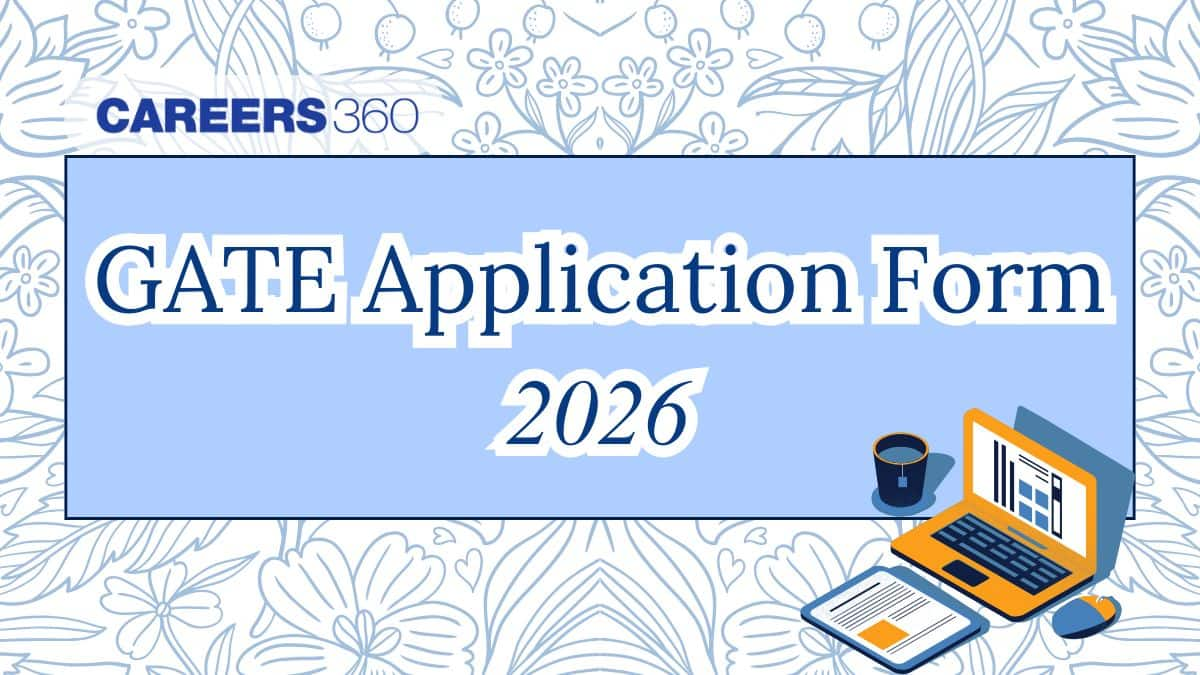
Candidates need to practice the GATE 2026 mock tests to score good GATE score in GATE 2026 exam. Read the article below to know more about the GATE 2026 registration.
Latest- GATE 2026 syllabus
The GATE 2026 application form registration was concluded with late fee on October 13, 2025. Aspirants had to follow the photo and signature guidelines while filling the GATE form 2026. The detailed GATE 2026 photo and signature guidelines had been provided online. Several online free PDF reducer tools are available that can be used for decreasing the document size as required for the GATE exam form 2026. For more details check the article.
The authority has deactivated the GATE registration 2026 link on the official website. The GATE 2026 registration release date was August 28, 2025. Aspirants of the Graduate Aptitude Test in Engineering can check the eligibility, documents required and other information about the GATE 2026 application form on this page.
The GATE exam registration link was provided on the official website. Refer to the table below for all GATE application form date and details.
Particulars | GATE 2026 Registration Details |
|---|---|
GATE Full Form | Graduate Aptitude Test in Engineering |
Exam Conducting Body | IIT Guwahati |
GATE application form mode | Online |
GATE 2026 registration official website | gate2026.iitg.ac.in |
Release of Notification | August 5, 2025 |
Start date to apply for GATE 2026 | August 28, 2025 |
GATE Last Date to Apply 2026 |
|
GATE 2026 registration last date with late fee |
|
GATE 2026 Registration Fees |
|
GATE Registration Fees With Late Fee |
|
Number of Attempts Allowed | There is no restriction in the GATE attempt limit |
Read more: GATE 2026 mock tests | GATE question paper | GATE best books 2026
To check the application status, candidates will have to log in at the GATE 2026 registration link using login credentials. If the application status of GATE is ‘Under Scrutiny/Under Process’, then the candidates need not worry. The responsible authorities scrutinize all the GATE application forms 2026 and those candidates whose application needs to be rectified in photograph/signature/supporting document get an automatic email/SMS.
In case candidates forget or misplace their GATE 2026 registration number, they can follow the below steps to retrieve their GATE enrolment ID or registration ID
Go to the GOAPS website, goaps.iitg.ac.in.
Click on ‘Forgot GATE 2026 Enrolment ID or Registration ID’
If you remember your Email Address but have forgotten the Enrolment ID and Registration ID, Click on 'Request for an OTP' to get One Time Password
If you already have an OTP, click on "Already have an OTP?" to reset the password
In case of any discrepancy, while filling out the GATE application form, candidates may contact the authorities through the GATE helpline number at 022-2576 7068 and 022-2572 4054
Quick Links:-
The authority has concluded the GATE 2026 application form correction window on November 18, 2025. The GATE exam application form correction link has been de-activated on the official website.The steps for the GATE registration form correction are as follows:
Login through GOAPS by entering your GATE enrolment number and password.
Correct the permissible details.
Pay the difference in fee if applicable and submit.
Save the application form for GATE 2026.
Items that can be corrected | Comments |
|---|---|
Name | According to the document submitted in the application |
Date of Birth | According to the document submitted in the application |
Gender | 1) Male to Female: Status could be changed, but Fees were not refunded 2) Female to Male: Candidates have to pay the amount of Rs 1000 (Rs 500 for SC/ST and PwD candidates) |
Category | 1) SC/ ST to Gen/ OBC: Candidates have to pay the difference amount of Rs 500 (not applicable for Female and PwD candidates) 2) Gen/ OBC to SC/ ST: Candidates can change the status but there is no fees refund |
PwD status | 1) No to Yes: Candidates were able to change their status but do not get the fee refund (Scribe status to be captured) 2) Yes to No: With fees of Rs 1000 (Rs 500 for SC/ST and PwD candidates) |
Dyslexia and other similar learning disabilities | 1) No to Yes: Candidates could correct the status but with a valid proof 2)Yes to No: Candidates could correct the status |
Details of Parents/ Guardian/ Correspondence address | According to the document submitted in the application |
College name and location, Roll no, Registration no. | According to the document submitted in the application |
Exam paper | Correction with fees |
Exam city | Correction with fees |
Description of Changes / Modifications | Fee Charges (per paper) |
|---|---|
Name changing | ₹ 500 |
Date of birth changing | ₹ 500 |
For changing choice of examination cities | ₹ 500 |
To change existing paper | ₹ 500 |
Change of category to SC/ST | ₹ 500 |
Change of category from SC/ST to any other | ₹ 500 (For female candidates or PwD candidates) ₹ 500 + ₹ 1000 = ₹ 1500 (For all other candidates) |
Change of gender from female to any other gender | ₹ 500 (For SC/ST and PwD candidates) ₹ 500 + ₹ 1000 = ₹ 1500 (For all other candidates) |
Change of gender to female | ₹ 500 |
Change from Non-PwD/Dyslexic to PwD/Dyslexic | ₹ 500 |
Change from PwD/Dyslexic to Non-PwD/Dyslexic | ₹ 500 (For female candidates or SC/ST candidates) ₹ 500 + ₹ 1000 = ₹ 1500 (For all other candidates) |
Details of Parents/Guardian/Correspondence Address | NIL |
College Name and Location, Roll No. | NIL |
Details of Qualifying Degree | NIL |
Any other change in category (not mentioned above) | ₹ 500 |
Related links:
Candidates who complete the GATE 2026 registration by paying the application fee will be able to download their admit cards from the official website. Applicants have to access the GATE GOAPS login to obtain their admit cards. Candidates with a valid GATE 2026 admit card will be allowed to appear for the GATE examination. The authority will announce the GATE 2026 admit card date on the official website. The GATE admit card will include details such as the candidate's personal details, exam date and time, centre address and guidelines.
Indian Institute of Technology, Guwahati announced the application dates for GATE 2026. The process for GATE form fill up 2026 was done online. Candidates had to fill out and submit the GATE 2026 application form by uploading the necessary documents. Check the GATE 2026 last date
Events | GATE Registration 2026 Dates |
|---|---|
Start date of GATE 2026 registration through GOAPS | August 28, 2025 |
GATE registration 2026 last date |
|
Last date for submission of the GATE exam application form (by registered candidates) with an additional late fee of Rs. 500 (Extended) |
|
GATE 2026 application form correction starts | October 28, 2025 |
Last Date for change of Category, Paper, and Examination City (extended) |
|
| GATE form correction window 2026 reopened | November 18, 2026 |
Release of Admit Card | January 2, 2026 |
GATE 2026 exam date | February 7, 8, 14, 15, 2026 |
Candidates who satisfy the eligibility conditions were able to apply for GATE 2026 online. The eligibility criteria include details such as age limit and minimum educational qualifications. Here is the stream-wise eligibility to satisfy before GATE form fill up.
There is no age limit to apply for GATE exam.
Candidates who are currently studying in the 3rd or higher years of any undergraduate degree program or who have completed any government-approved degree program in Engineering/Technology/Architecture/Science/Commerce/Arts/Humanities are eligible to appear for GATE 2026.
Candidates must upload the required documents for GATE 2026 registration in the specified format. The list of documents required for GATE 2026 application are mentioned below. It is advised to keep the following documents handy while filling out the GATE 2026 application form.
Documents | Dimensions |
|---|---|
Photograph |
|
Signature |
|
A scanned copy of a photo Identity document: Aadhar-UID (preferable), Passport, PAN Card, Voter ID, and Driving License | N/A |
Scanned copy of Category (SC/ST) certificate in pdf format (if applicable) | N/A |
Scanned copy of PwD Certificate in pdf format | N/A |
Scanned copy of Certificate of Dyslexia (if applicable) in pdf format | N/A |
To know the complete GATE form fill up 2026 process, refer to the given step-wise GATE application form submission process
Visit the GATE registration 2026 official website, gate2026.iitg.ac.in login, that is GOAPs portal.
Click on the GATE registration link and complete the registration process.
Login credentials will be generated.
Proceed to fill out the GATE 2026 application form with exam details, personal and academic information.
Upload scanned images of the requisite documents.
Fill the online declaration.
Check the preview of the filled application form of GATE 2026 and verify details.
Submit the GATE registration 2026.
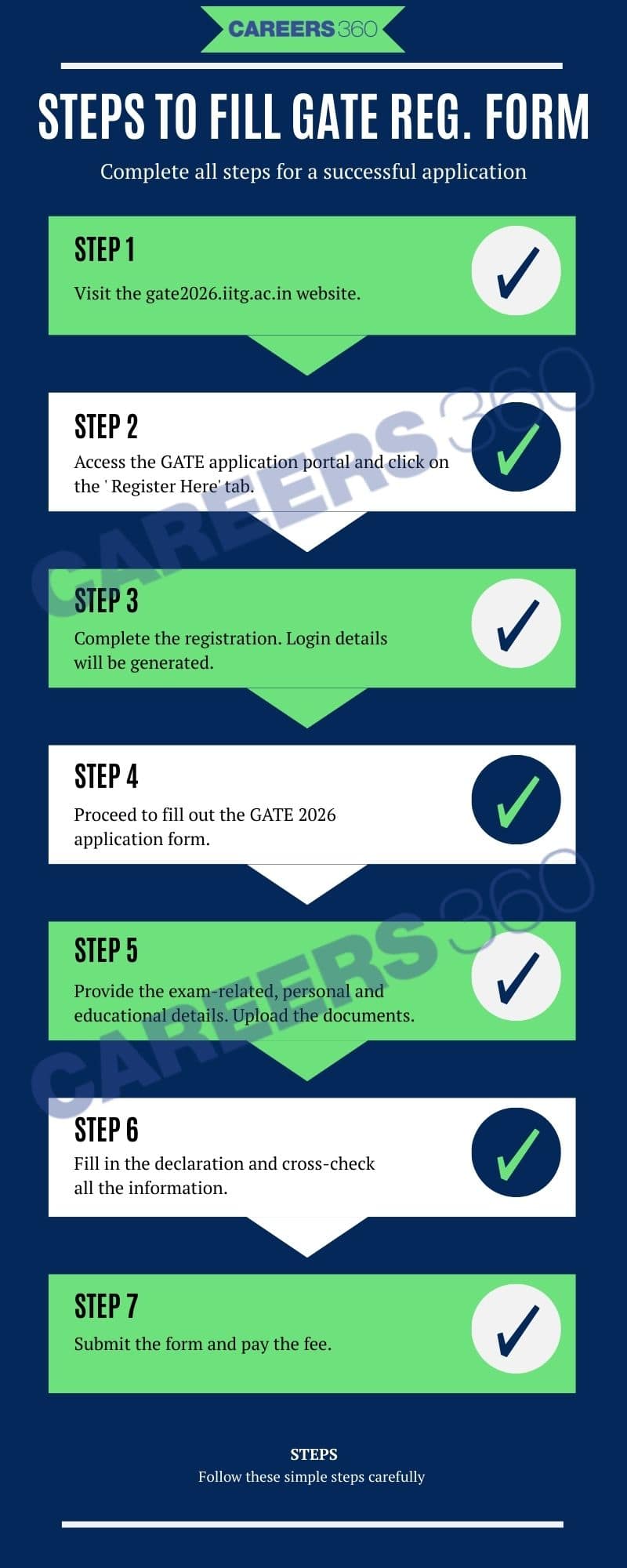
Candidates must be aware of the details required while applying for the GATE 2026 exam. These details must be kept handy prior to applying for the GATE exam. The details required for the GATE exam registration 2026 include:
Personal information (name, date of birth, personal mobile number, parent's name, parent's mobile number, etc.).
(Please note that the name of the candidate in the GATE application form must exactly be the same as that in the valid photo ID, which the candidate will have to produce in original while appearing for exam at the centre. GATE 2026 scorecard will be issued as per the name entered in the GATE exam application form.)
Prefix/titles such as Mr / Shri / Dr / Mrs / Smt / Prof / Capt / Maj / Lt / Col / Er / Ar, etc. must not be used before names.
Address for Communication (including PIN code).
Eligibility degree details.
GATE paper(s) / subjects and their codes in which the candidate wishes to appear.
Three Choices of GATE examination cities (from the same zone).
Net-banking /debit card/credit card / UPI / wallet details for fee payment.
Candidates may also check:
Read the step-by-step procedure to fill and submit the GATE application form 2026:
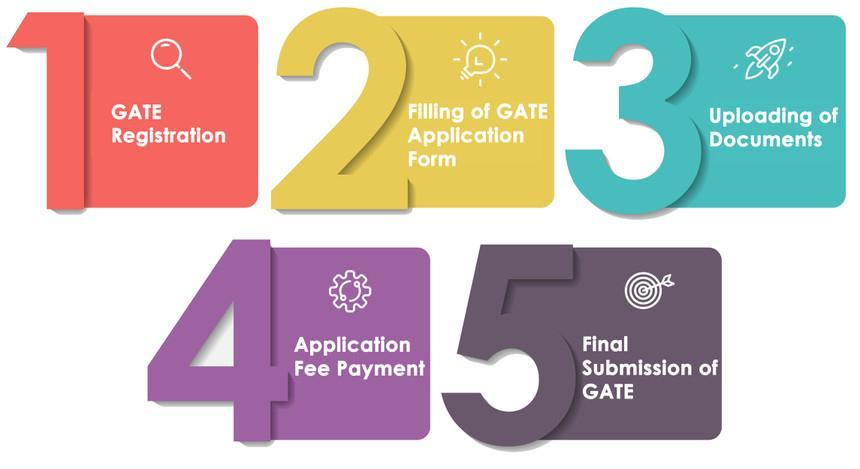
Step-by-step procedure to fill GATE application form
Step 1 - GATE Registration: This is the initial step in the GATE 2026 registration. Candidates can register through the GATE online application processing system (GOAPS) using the registration link. Following are the GATE exam registration details
Candidate’s first, middle name and surname
Valid email ID
Country of residence
Mobile number
Password for future login

After entering all the above-mentioned details, click on the 'confirm' tab. A system-generated One Time Password (OTP) will be sent to the registered email ID and mobile number. Use the OTP to complete the GATE 2026 registration. Thereafter, a unique enrollment ID will be allotted to the successfully registered candidates.
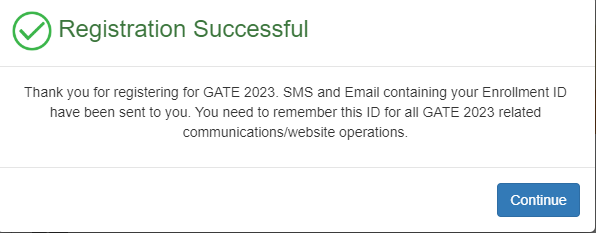
Note: If there is a delay in receiving the OTP, the candidates can proceed with payment with verification of either email ID or mobile number. The remaining one can be verified at a later stage.
Step 2 - Access the GATE login portal and fill out the online application form - Enter the following details to fill out the application form once the GATE 2026 registration is completed:
Personal Details: Information like the name of the candidate, father’s & mother's name, date of birth, nativity etc need to be entered.
Academic Detail: Information related to academic qualifications from HSC till graduation needs to be entered.
Communication Details: Address as well as the permanent address needed to fill.
GATE Paper: Select the GATE paper appearing for. Note: Change of GATE 2026 exam paper is not allowed after submission of the form.
GATE 2026 Exam Centre: Select a total of three exam cities from the given list. The first two centres must be from the same zone while the third can be from any GATE 2026 regional zone.
Photo Identity Proof: The photo ID number and type of ID have to be entered
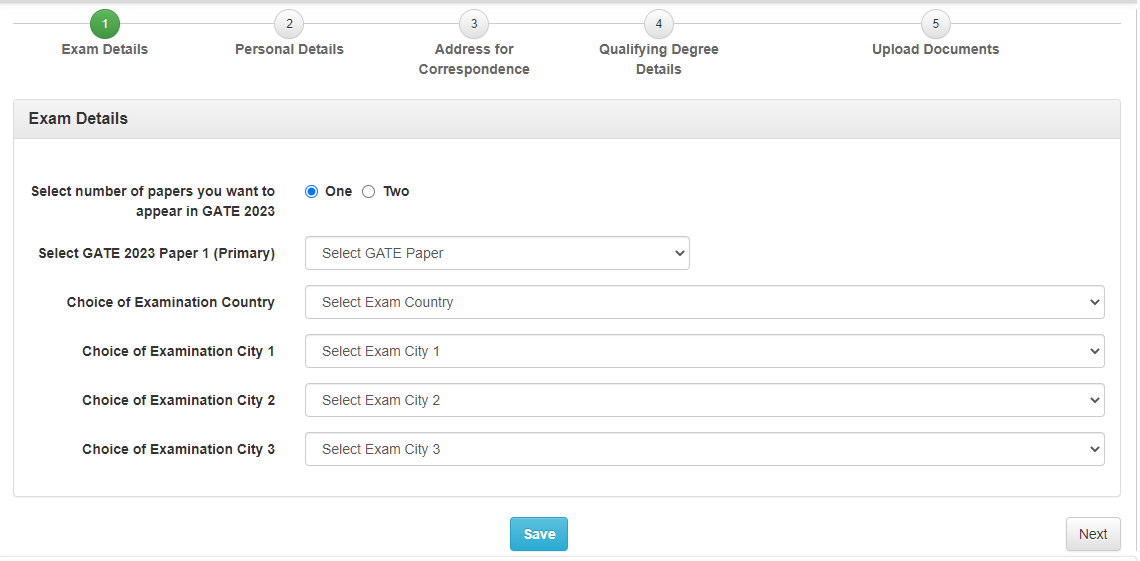
Step 3 - Upload scanned images of photo, signature and other documents

Step 6 - Submit the GATE exam application form: After successfully paying the registration fee, submit the GATE 2026 application form. Only those candidates who will register successfully will be able to access the admit card Therefore, aspirants should complete the registration process before the GATE last date to apply.
| First Paper Code | Second Paper Code |
| AE | CE, ME, XE |
| AG | CE |
| AR | CE, GE |
| BM | BT, IN |
| BT | BM, XL |
| CE | AE, AG, AR, ES, GE, NM, XE |
| CH | ES, PE, XE |
| CS | DA, EC, GE, MA, PH, ST |
| CY | XE, XL |
| DA | CS, EC, EE, MA, ME, PH, ST, XE |
| EC | CS, DA, EE, IN, PH |
| EE | DA, EC, IN, PH |
| ES | CE, CH, GE |
| EY | XL |
| GE | AR, CE, CS, ES, GG |
| GG | GE |
| IN | BM, EC, EE, ME |
| MA | CS, DA, PH, ST |
| ME | AE, DA, IN, NM, PI, XE |
| MN | - |
| MT | XE |
| NM | CE, ME |
| PE | CH |
| PH | CS, DA, EC, EE, MA, XE |
| PI | ME, XE |
| ST | CS, DA, MA, XH |
| TF | - |
| XE | AE, CE, CH, CY, DA, ME, MT, PH, PI |
| XH | ST |
| XL | BT, CY, EY |
IIT Guwahati has released the list of GATE 2026 exam centres on the official website. Candidates must select their preferred GATE exam centre 2026 while completing the GATE 2026 registration. Exam cities were added for GATE 2026 in various zones: IISc Bangalore (Puttur), IIT Delhi (Bhilwara, Dausa, Hanumangarh), IIT Madras (Nandyal, Erode, Krishnagiri, Pollachi), and IIT Guwahati (Baddi, Palampur, Una). The exam centres will be allotted based on the preferences chosen during the application process.
Zones | GATE Exam Cities |
|---|---|
IIT Guwahati | 26 |
37 | |
37 | |
22 | |
24 | |
14 | |
30 | |
48 | |
Total | 238 |
Frequently Asked Questions (FAQs)
The registration for GATE 2026 was held till October 13, 2025.
Candidates had to fill out and submit the GATE application form 2026 online. Students can refer to this article to find the detailed procedure to fill out and submit the GATE 2026 application form.
To pay the GATE 2026 application fee, candidates had to use online modes such as net banking, credit card, debit card, or UPI. The GATE registration fee for general category applicants is Rs 2000 (without a late fee) and Rs 2500 (with a late fee).
The GATE 2026 registration last date was October 7, 2025 (without a late fee) and with a late fee, it was October 13, 2025.
For female and reserved category candidates applying for GATE 2026 had to pay Rs. 1500 as a late registration fee. The GATE 2026 late fees for all other candidates was Rs 2500 for a single paper.
The GATE exam fee for per test is Rs. 1000. Therefore, candidates who wished to apply for 2 papers had to pay Rs. 2000.
GATE exam registration link was available at gate2026.iitg.ac.in.
GATE 2026 registration fees is 2000 for all categories except Female/SC/ST/PwD. The GATE 2026 fee for Female/SC/ST/PwD is 1000.
No. One e-mail address can be used to submit only one GATE application form 2026. Candidates are discouraged from filling out multiple GATE exam application forms using different email addresses.
On Question asked by student community
Hello,
The link to the question paper is attached here. You can also find the answer key that will help you analyse your in-depth performance. Careers360 provides students with preparation tips that will help them utilise their time effectively in preparartion.
https://engineering.careers360.com/articles/gate-metallurgical-question-papers
Thank you
Hello,
Yes, you can get admission in M.Tech CSE without GATE .
Through university entrance exams
Many universities conduct their own M.Tech entrance exams. You have to qualify the test and sometimes attend an interview.
Through JET for M.Tech
JET (JAIN Entrance Test) is conducted by Jain University.
It is
Hii
No you cannot get admission to IIT for M Tech if your B Tech is not completed at the time of admission, even if you clear the GATE cutoff but Yes, you can appear for GATE 2028 in your 3rd year of B Tech even if your degree is
Hello,
The link to the question paper is attached here. You can access the question papers along with the answer key on the careers360 website. Careers360 also provides students with preparation tips that will help them in preparing and the mock test and analyse their in-depth performance.
https://engineering.careers360.com/articles/last-15-years-gate-papers-solutions
Thank you.
Hello,
Here is a link for the sample papers for GATE Exam with DA subjects. Tap on the link given below to open it:
Thankyou.
Among top 100 Universities Globally in the Times Higher Education (THE) Interdisciplinary Science Rankings 2026
NAAC A+ Accredited | Among top 2% Universities Globally (QS World University Rankings 2026)
Last Date to Apply: 25th Feb | Ranked #45 Among Universities in India by NIRF | 1950+ Students Placed 91% Placement, 800+ Recruiters
1st in NPTEL program of 6 IITs | Highest CTC 72 LPA | Scholarships to meritorious students
Asia’s only university to be awarded the highest accreditation by WASC, USA and by the Quality Assurance Agency for Higher Education (QAA), UK
Online PG programs from Symbiosis Centre for Distance Learning